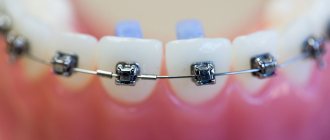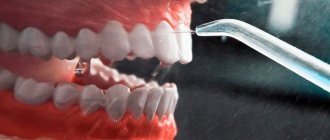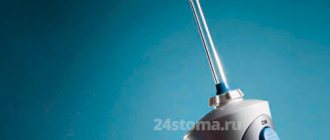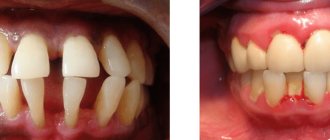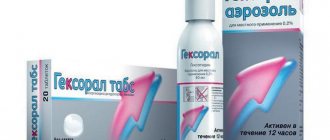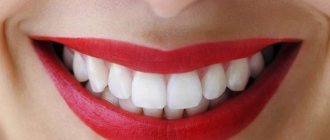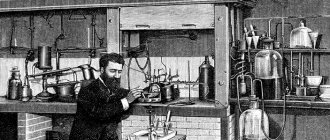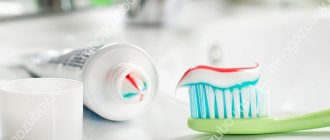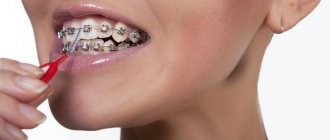An electric or regular toothbrush, floss, and irrigator - these are approximately the types of devices a person uses to clean their teeth and oral cavity. Almost all of the listed “tools” are known to everyone and are used everywhere. The only exception is the last one. It is this device that raises many questions and is shrouded in a variety of myths. Many people do not understand the principle of its operation and the need for use; they believe that this is an exclusively professional device. In this article we will tell you what the benefits and harms of its use are, how and why to use it and why you need an irrigator, and we will also describe the differences between the types and give recommendations for choosing.
The purpose of the device is thorough and high-quality oral hygiene at home. It can remove plaque and food particles from all hard-to-reach places (including used orthodontic appliances) much better than using a toothbrush. It can also be used to massage the gums in order to improve their blood supply and, as a result, maintain dental health.
The device consists of a liquid reservoir and a handle with a nozzle, which are connected to each other by a thin tube. Water or a medical solution recommended by specialists enters the handle under pressure, providing thorough cleaning of the oral cavity and massage of the gums.
Before use, we advise you to consult with dental specialists.
Who needs an irrigator and why?
Dentists recommend using this device regularly to:
- better hygiene to prevent caries and other diseases;
- care of orthodontic structures (braces, veneers, dentures, bridges);
- treatment of chronic forms of gingivitis and periodontitis.
People cannot do without the device:
- suffering from bad breath;
- having a non-standard arrangement of the dentition;
- patients with diabetes mellitus.
The device can be used for both preventive and therapeutic purposes. It cleans teeth, interdental spaces, gum pockets and other hard-to-reach places from germs, plaque and food debris more thoroughly than other devices. Thereby reducing the likelihood of caries and other diseases and eliminating unpleasant odors.
Is it necessary to use an irrigator with installed braces, veneers, bridges and other structures? The answer is yes. The fact is that all orthodontic devices for correcting bites and solving other problems “like a magnet” collect microbes and food particles and, in the absence of proper care, can cause an exacerbation of existing diseases. In this case, you should take very good care of your oral hygiene. This is only possible with daily use.
This device is especially relevant for people suffering from diabetes. Unfortunately, with this disease, the blood circulation of the gums is impaired, and, as a result, periodontitis occurs. Regular massage performed with a pulsating jet improves their blood supply, maintaining dental health. This is also important for people who do not suffer from this pathology.
The irrigator is also used to treat certain diseases. To do this, instead of ordinary boiled water, use a special medical solution that has the required medicinal properties. For example, furatsilin, chlorhexidine, diluted rinses or various herbal decoctions.
But each method has contraindications. For advice on the use of a medicinal drug, you can contact dental specialists.
Whether you need a dental and oral irrigator at home is up to you, but remember that its effectiveness is achieved through regular use. In addition, by purchasing such a device for home use, you significantly save on the cost of dental procedures. And if other family members also use the device, then your savings will be two, three or even four times greater. In addition, any disease is easier to prevent than to treat later.
Miswak powder - features
As an alternative or in addition to the toothpick, you can purchase a charcoal-based toothpowder made from arrack wood. This natural remedy has a pronounced whitening and anti-inflammatory effect, reduces bleeding gums, and freshens breath. The composition includes additional ingredients that increase the healing properties of the powder (cloves, black cumin, cinnamon).
It is used in the same cases as sticks: for the prevention and treatment of caries and gum disease.
The powder is more convenient to use, as it does not require special preparation and storage. It is more suitable for children, as well as those who have difficulty chewing a stick for a long time.
I buy pure miswak powder without additives and make my own tooth powder according to my recipe. I take one part miswak, one part ground herbs and one part store-bought “Special” or “Mint” tooth powder. I mix everything, add essential oils and sift through a strainer. I store it in a jar with the lid closed.
Is there any point in using it?
You can also brush your teeth with a toothbrush. But only an irrigator can remove plaque and food particles from all hard-to-reach places, including various orthodontic structures, as much as possible.
Using a water jet, it literally washes them away from all hard-to-reach areas, thereby reducing the likelihood of caries. At the same time, it additionally massages the gums, improving their blood supply. Massage prevents the formation of periodontitis, and in combination with special medical solutions, it not only inhibits the development of its chronic form, but also treats it.
In most devices, the jet pressure can be adjusted, which significantly improves the quality of the procedure performed.
A toothbrush with a full history
Humanity has been using miswak for several thousand years, and during this period of time the miracle remedy has received a large number of titles. It is called meswak, meshwak, and also siwak and chewing stick. In essence, this is a full-fledged toothbrush, simply made of wood and completely independent. That is, practically no Colgate is needed in the Mesvak kit.
People began to use such a stick in the pre-Islamic era; in the future, the miswak became known in Islam. The Prophet Muhammad spoke about the benefits of siwak, Allah bless him and greet him, so the wooden brush was mentioned more than once in religious books.
But at present, the popularity of siwak in the east has long crossed all possible religious and cultural boundaries. The toothbrush is used not only in the Middle East, but also in Asian countries. It is actively purchased by adherents of a healthy lifestyle and fans of ecological products: vegans, vegetarians and raw foodists all over the planet. Meshwak is in a certain category with such fashionable eco-products as soap nuts, deodorant with alum, etc.
Can the device cause harm?
We found out what benefits the irrigator brings to the teeth and oral cavity, but can it cause harm?
There are practically no contraindications for use. But people with acute forms of gingivitis or periodontitis, as well as patients who have recently undergone dental surgery, for example, installation of an implant, can use this device only after complete recovery.
We advise you to use it in strict accordance with the instructions and recommendations of your doctor. This is the only way to achieve optimal results.
But keep in mind that if used daily for more than 15 minutes, it is possible not only to increase sensitivity, but also to cause bleeding gums. Thus, calling into question the usefulness of the irrigator - is it needed at all?
Please note that to cleanse the oral cavity, it is better to take at least plain boiled water. This will significantly reduce the risk of harmful bacteria entering the body from the water supply.
How to store a miswak stick
Sometimes, along with the stick, you can immediately purchase a container for storing it. This is convenient, but a regular toothbrush case will do. In any case, you should keep the miswak in a closed container. Otherwise, most of the volatile essential oils will evaporate, and the stick itself will become moldy. Such a siwak can no longer be used.
It is best to store the stick with the brush cut off. In this case, bacteria will not accumulate at the end of the stick.
Fresh sticks are sold in vacuum packaging with an expiration date indicated. It is recommended to store the unopened stick at a temperature no higher than 15 degrees. After opening, the period of use should be no more than 3 months.
Are all devices the same?
Depending on the type of power supply, stationary, portable and flow-through devices are distinguished.
The first one runs on mains power and therefore requires installation near an outlet. The second one is powered by a battery or batteries; you can take it with you on trips and travels.
The flow type is connected directly to the water tap. Its main drawback is the inability to use purified water and special medical solutions.
How are irrigators different?
When choosing a device, you should pay attention to:
- Jet pressure. The larger it is, the better the result will be achieved, but too much pressure can cause discomfort and even harm. Therefore, choose a device with the ability to change power in order to select a comfortable mode for performing the procedure.
- Availability of special settings and additional functions. For example, a pulsating jet for gum massage or microbubble technology.
- Number and types of attachments (for teeth, tongue, gum tissue, braces, veneers and other structures).
- The volume of the tank for medical solution or ordinary water. A small container will require adding liquid during the procedure, and a large device cannot be taken with you on trips and travels.
- Battery capacity, operating and charging time when choosing a portable analogue.
If you plan to use the device for all family members, then you should choose a stationary type of irrigator. It has many attachments and a large liquid reservoir. For individual use or for frequent trips and travel, its portable counterpart would be the best choice. When purchasing it, pay attention to the operating and charging time of its battery.
If you plan to use the device only for thorough oral hygiene, choose a simple mono-jet device.
When wearing braces, veneers, bridges and other structures, make sure that the orthodontic attachment is included in the package. In some cases it can be purchased additionally. For the treatment of chronic gingivitis and periodontitis, we recommend using a regimen with microbubble technology.
Consumer Reviews
Below are some customer reviews. If you have something to say, leave your feedback in the comments below the article, it will be useful to our readers.
Succumbing to the advertising of an online store, I bought a stick of miswak “to try”, fortunately the price was low. I opened it, washed it with water, chewed it, everything according to the instructions. The hot water made the bristles soft and brushing my teeth was pleasant. I was surprised at the pleasant feeling of cleanliness on my teeth, there was no plaque, and this despite the fact that I just cleaned them with a branch, without any product! I liked the effect, I will continue to brush my teeth with this stick!
I bought a miswak on the advice of a friend. I liked that there was no pronounced taste or smell, there was a slight bitterness, like cigarette smoke. It cleans well, but it takes more time than using a regular brush. You can leave it for evening cleaning, or take it with you and use it throughout the day, and you don’t have to carry the paste with you.
How difficult is the device to use?
We've looked at what an irrigator is for, now let's talk about how to use a home device for cleaning your teeth. By following the operating instructions and the recommendations presented below, you will easily master the skills of its use. Even small children can cope with this.
User manual:
- Brush your teeth and rinse your mouth.
- Pour ordinary boiled water or medical solution into a special container.
- Turn on the irrigator.
- Select the desired mode or adjust the jet pressure.
- Place the nozzle of the nozzle perpendicular to the gum.
- Treat each tooth and interdental space from all sides.
- Rinse your mouth.
- Turn off the device.
The described algorithm is only suitable for a stationary device. For a portable analogue, the sequence of actions will be slightly different.
If you still have any questions, contact a dental specialist. Our doctors will not only give recommendations for use, but also, if necessary, prescribe a medical solution that is suitable for you.
FAQ
The remedy is not as popular here as in Muslim countries, and therefore there are still a lot of questions.
Is it possible to give a stick to children and at what age?
Due to the anti-inflammatory properties of the product and its natural composition, Miswak can be given to children after four months. But it should be used under strict parental supervision to prevent accidental ingestion of lint.
When is the best time to trim used lint?
It is best to trim the bristles after each use to prevent bacteria from accumulating there, or after the stubble becomes very thin.
How long to chew?
Here you need to build on the person’s preferences and chew until the hardness becomes comfortable for use. As a rule, you need to chew for at least five minutes to achieve the separation of the end into fibers. Before use, it must be soaked in water.
Is use allowed on restored teeth and with removed nerves?
Yes, there were no complaints from consumers about this. Just keep in mind that the product can only whiten natural enamel. Therefore, the color of the artificial material may subsequently begin to differ from the rest of the teeth.
Can I use the product during pregnancy and lactation?
During pregnancy, the product can be used due to its natural origin. There are no substances in the composition that can cause uterine contractions or cause an allergic reaction in the child.
Will using this product damage the enamel?
Miswak does not contain abrasive substances, so it does not have a negative effect on the enamel. But if the enamel is thinned or prone to abrasion, then you need to use the stick carefully, without pressing on it with force.
Alternatively, you can use a thinner size. In addition, you should monitor the condition of the product, avoiding severe drying out.
What is the expiration date?
In undamaged packaging it can be stored for 12 months, but at a temperature of +15 degrees. After opening the package, the stick must be completely used no later than three months.
What does the white coating on a twig mean? Is she spoiled?
No, everything is fine with Sivak if the expiration date has not passed. In general, the white coating is formed due to the dried salt contained in the plant itself. This is quite normal for this product.
Should you just brush your teeth with the brush or use toothpaste along with it?
If you use Miswak sticks, there is no need for toothpaste. The product perfectly replaces both a brush and toothpaste.
Can the whole family use one device?
The reasons why and why you need an irrigator for teeth and oral cavity are the same for both adults and children. But dentists advise children to use the children's analogue after the formation of a permanent row, since improper use of the device can harm the more delicate and vulnerable milk teeth.
The main rule is that children should perform the procedure only under the supervision of adults, since independent use is fraught with dangerous situations, for example, tracheal spasm as a result of a pressurized water jet entering the respiratory tract. In addition, kids forget to follow the rules for safe handling of electrical appliances.
Do not worry that a small child will be afraid of this procedure. Make it a fun game as many children love to play with water guns. All you have to do is draw an analogy.
Teenagers can use an adult device on their own, but for hygiene reasons, they must purchase an individual attachment. The same requirement applies to other family members.
What is the price
The cost of a natural toothbrush varies depending on the length and thickness. A small stick 15 cm long costs about 150 rubles. They are sold in vacuum packaging individually. Some manufacturers add flavoring - lemon, mint.
This is interesting: Chlorophyllipt for stomatitis in children and adults - how to use
Sivak Sewak al-Falah - made in Pakistan, 15 cm long, sold in vacuum packaging one piece at a time, cost about 150 rubles.
The Al-Khaleej branch is a black stick, does not require the use of toothpaste, costs 80-100 rubles.
Sivak Khair - made in Pakistan, has a length of 15 cm, cost - 90-120 rubles.
At the same time, you can purchase a case for convenient storage. You should not immediately switch to cleaning your mouth with such a stick. It is better to use it between regular teeth brushing, and when you have the skills to clean each tooth, then you can switch to the siwak stick. You can’t do without consulting a dentist and a specialist’s opinion on this matter.
How effective is the device?
High results from using the device are built into the principle of its operation. Mechanical removal of germs, plaque and food particles using a water jet will allow you to efficiently clean many places that toothbrushes, orthodontic brushes and other dental cleaning devices cannot reach. In addition, the pressure in most devices can be adjusted, which significantly improves the quality of the procedure.
Where does miswak grow?
The tree from which miswak is made is called “Salvadora persica” (from Latin). In Arabic, the name of this useful shrub is “Arak”. Grows in subtropical and tropical climates. The “toothbrush tree” can be found in India, Pakistan, North Africa, and the Arabian Peninsula. This is a small shrub up to 5 m high. The bark is brown, with a pleasant smell. The leaves are edible, with a mustard flavor (which is why arak is also called mustard tree). The leaves are used in India as a green for vitamin salads.
Salvadora Persiana grows in desert and clay soils. Harsh growing conditions contribute to the accumulation of large amounts of biologically active substances in the plant. This is necessary so that the tree can survive in unfavorable conditions.
How to care for the irrigator, do you need to clean it specially?
All care rules are described in detail in the operating instructions.
Here are the manufacturers' recommendations for cleaning it after each use:
- Unplug the stationary appliance from the outlet.
- Drain off any remaining liquid.
- Rinse the tank and nozzles under running water, even if you used regular boiled water.
- Wipe with a soft cloth and dry all elements.
- Your device is ready for further use!
Here are some additional recommendations:
- Do not leave residual liquid in the reservoir.
- To clean the internal elements from scale, use only a special cleaning agent.
- Do not use abrasives or alcohol solutions to clean the housing.
- Always unplug the stationary device from the outlet.
- Do not immerse the device in water or other liquid.
- Remove any residue and dry the device before traveling in the cold season.
As you can see, caring for it is as easy as a regular electric kettle.
Advantages
A natural “brush” (another name is sivak) has advantages comparable to the useful qualities of modern cleaning devices. Judge for yourself: miswak contains anti-inflammatory and antiseptic substances, the presence of which makes applying paste or powder to the teeth unnecessary.
Among the “advantages” is the presence in the composition:
- fluorine;
- tannins;
- flavonoids;
- alkaloids;
- fragrant resins;
- essential oils.
In terms of content, the stick of the Salvadora Persian tree is similar to toothpaste and in some ways even surpasses it: the components are natural. For those who are wary of “chemistry”, this point is important. Fluoride strengthens enamel, tannins and flavonoids prevent inflammation, essential oils stop the proliferation of bacteria, and give fresh breath.
A nice bonus: miswak contains silicon dioxide, which whitens teeth. This occurs without damaging the enamel, which, unfortunately, is experienced by patients after professional whitening in the dental office. Silicon destroys pigmentation and fights soft plaque.
This is not all the advantages of the siwak. It is convenient for patients because:
- fits in a plastic bag that you can simply put in your pocket;
- Available for use by people of all ages - from babies to the elderly.
A modest stick - a piece of a branch of an outlandish Asian plant - is inexpensive, but has so many advantages that it’s time for many of us to think about buying it. Many - but not all? Yes, there are contraindications.
Let's sum it up
An irrigator is an effective home tool for maintaining oral hygiene. With its help, you can easily and efficiently clean your teeth and all hard-to-reach places from germs and food debris, thereby reducing the likelihood of various diseases, eliminating unpleasant odors and extending the life of fillings and crowns. It is indispensable for the care of orthodontic structures and is a reliable prevention of periodontitis for people suffering from diabetes.
There are practically no contraindications for its use. We recommend using the irrigator according to the instructions of your doctor and the instructions for use.
All family members can use one device, but for hygiene reasons, each person should purchase their own attachment. Children can begin the procedure after replacing baby teeth with permanent teeth, but under adult supervision. Teenagers can independently use the same device as their parents.
It is easy to operate and maintain. You can easily purchase a high-quality device with all the necessary functions at an affordable price.
In this article, we tried to talk as simply and clearly as possible about why an irrigator is needed. Remember that its use is an additional hygiene procedure. It is impossible to replace the use of a toothbrush, and the maximum effect is achieved with regular use in accordance with the recommendations of the attending physician.
Chemical composition of siwak
The beneficial properties of siwak are associated with its excellent chemical composition. Miswak contains over 25 natural highly active components that have an extremely beneficial effect on human health. This:
- tannic acids;
- soda bicarbonate;
- cellulose components;
- essential oils;
- aromatic resins;
- substances of the alkaloid group;
- salts of useful minerals;
- fluorine;
- substances of the sulfur group;
- vitamin C;
- silicon in the form of dioxide;
- saponin;
- flavonoids;
- styrene;
- trimethylamine.
One can only be amazed at the wisdom of nature, which has combined in one plant a chain of components that are beneficial specifically for the health of teeth, gums and oral mucosa! This makes Sivak an absolutely unique natural product.
